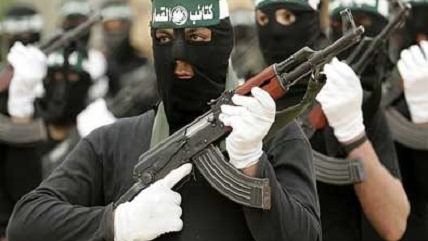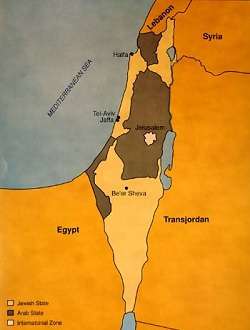Gaza and the Horrors of Governments
Governments war, people die


Last week the satirical newspaper The Onion ran a piece about a "317,000,000-State Solution" for the Middle East, a riff based on the "two state solution" for Israel and Palestine. Given the long history of abuse perpetrated by their warring governments, it's hardly a bad idea. The proposal for co-existing, independent states of Israel and Palestine in the territory currently comprising the state of Israel, its occupied territories, and the land in Gaza and the West Bank administered by Palestinian authorities has been around for decades and in fact was part of a proposed United Nations plan for the partition of Palestine when it was a British mandate. Despite heavy involvement by the United States and its presidents in the Israeli-Palestinian peace process for decades, the two-state solution wasn't endorsed by the any U.S. president until George W. Bush did so in a speech in the Rose Garden in the summer of 2002.
In 2005, after the death of long-time Palestinian leader Yasser Arafat in France, Palestinians elected Mahmoud Abbas of the ruling Fatah party president of the Palestinian Authority. In 2006, legislative elections saw the militant group Hamas winning 76 out of 132 seats. Although the group omitted for the first time a call for the destruction of Israel in its manifesto ahead of the elections, it offered only a 10-year-truce with Israel in exchange for a complete Israeli withdrawal from the West Bank and Gaza, territory that came under Israeli control after the Six Days' War between Israel and its Arab neighbors in 1967.
Prior to that war, launched by Israel in response to massive military buildups by each of its three neighbors, Egypt (then known as the United Arab Republic), Jordan, and Syria, the Gaza Strip and the West Bank had become occupied (the latter eventually annexed) by Egypt and Jordan, respectively, after the 1948-1949 Arab-Israeli war. That war followed Israel's declaration of independence in 1948, itself a response to Arab governments' refusal to accept the U.N.'s 1947 two-state solution. Palestinians call Israel's declaration of independence, the wars preceding and following it, and the consequent exodus of refugees the nakba, or disaster. Palestinian claims to the right of return trace back to that time period, as does hostility to a Jewish state. The passage of the U.N.'s 1947 two-state partition of Palestine was celebrated by Jews in the region and protested by Arabs. There were an estimated 700,000 refugees after the 1948-1949 Arab-Israeli war. There are about five million Palestinian refugees today, primarily descendants of the original refugees. Only about 30 to 50 thousand of the 1948 refugees remain. These millions of refugees are located in Israel, the Palestinian territories, Jordan, Lebanon, and Syria. Only in Jordan have most been given full citizenship.
This month, Israel launched its first land offensive into Gaza since 2009 in response to hundreds of rockets being lobbed into southern Israel by Hamas militants over the last years. What happened after the 2006 election was that Fatah—the corrupt ruling party repudiated in the election—and Hamas refused to cooperate on sharing power and governing. In the summer of 2007, Hamas used its military fighters to take control of Gaza and expel Fatah. Israeli forces and settlers were withdrawn from the Gaza strip in 2005, based on then-Prime Minister Ariel Sharon's proposal. Gaza's border with Israel was tightly guarded, as was Gaza's border with Egypt (the Sinai peninsula). The population of Gaza moved from Egyptian occupation to Israeli occupation to Hamas occupation. The 2006 election was the last held in Gaza. Subsequent elections were postponed as the fight between Hamas and Fatah verged on civil war. As the latest round of U.S.-brokered peace talks between the governments of Israel and Palestine were breaking down, Fatah and Hamas finally agreed on a unity government earlier this year. The indiscriminate lobbing of rockets by Hamas into southern Israel continued and even escalated. Israel's current offensive in Gaza was sparked in part by the kidnapping and murder of three Israeli teenagers last month—the Israeli government may have known the children were murdered soon after the kidnapping occurred although it placed a gag order on the media and announced only that the children were missing. Eventually, Israeli security forces arrested more than 400 Palestinians including senior Hamas officials and 12 legislators.
The kidnapping and the drawn out search for the missing children helped inflame public opinion in Israel, permitting Prime Minister Benjamin Netanyahu to pivot toward a military response against Hamas. Although the deployment of the Iron Dome in 2011 has made Hamas' haphazard lobbing of rockets even less effective at causing death and damage than it already was, Hamas' campaign of terror is successful in inspiring fear among Israelis. At The Atlantic, James Farrows ran a note from an anonymous American rabbi in Jerusalem who gave thanks for the Iron Dome for providing relief from terror, noting that "if you save one life, it is as if you have saved an entire world" and expressing his gratitude "for the Israeli 'know how' that created it, the effective AIPAC lobbying that ensured its funding, and the Congressional and Presidential support that made it available to the citizens of Israel."
Fallow received a response from Hillel Ben Sasson of the Israeli think tank Molad critical of the rabbi's portrayal of Hamas rocket fire and the Iron Dome as something from a World War II submarine movie. "By generalizing his personal sense of fear and acting as a spokesman for those who actually carry the burden of living in Israel, the rabbi grossly exaggerated the impact of Hamas terror on Jerusalem and portrayed it with unduly epic dimensions," he wrote. "In so doing, he distorts the actual power imbalance in this tragic situation, in addition to victimizing me and my fellow Israeli citizens."
Sasson qualified that his comments didn't mean he was "disregarding the fear and anxiety felt by many Israelis who are in the line of fire day after day" but he did point out that "while the Gazans are rained with high-precision ton-heavy bombs falling with no sirens or alert system, we in Jerusalem have heard three sirens in the past nine days, and witnessed no rocket falling."
In the meantime in Gaza, where Hamas has built an infrastructure for its terror campaign that includes vast costly tunnels but no infrastructure to protect its "citizens," instead using them as human shields, residents often see no other choice, believing that the attention paid to a continued, bloody, conflict could also bring attention to their grievances, as The Economist explained. Although the Israeli military says it tries to limit civilian casualties by dropping warning bombs first and calling homes it is about to bomb, there is no place for Gazans seeking to escape the conflict to go. Their borders with Israel and Egypt are effectively closed. Hamas insists on continuing a military struggle against Israel even as, or perhaps because, it further isolates Gazans economically and politically.
In the U.S., every time an incidence of "gun violence" makes the national news, certain political groups call for an immediate widespread curtailment of Second Amendment rights to combat the threat. Feelings of terror, however they are generated, can be powerful motivators for reactionary politics. The effort to curtail gun rights often fails in the U.S. because the intended victims of the rights-deprivation are a part of the political process and enjoy broad support despite a vocal, almost hysterical, opposition. The Gazans have no say in Israeli politics—their opinion on being bombed is irrelevant. And they have little say in Palestinian politics, either, when their leaders can't agree on elections, stake their survival in escalating conflict with Israel, all while propagandized their population with the same anti-Israeli hatred that animates their politics.
The people of Israel and Palestine, then, are stuck in a cycle of politically-expedient violence, fueled by historical grievances and inter-generational distrust and sanitized by religious zealotry. When President Obama went to the leaders in the Middle East to talk about the Israeli-Palestinian peace process, they were more interested in talking about containing Iran—a goal shared by Israel. Hostility toward Israel is a useful rhetorical tool to draw attention away from failed government policies and maintain power, but Arab governments might find their interests more aligned with Israel's than they think. And peace between Israel and its Arab neighbors would do more for the lives of Palestinians than using them as geopolitical pawns. "Do not force your children to behave like you," wrote the fourth caliph, Ali, in a famous hadith, "for surely they have been created for a time which is different to your time."


Show Comments (107)